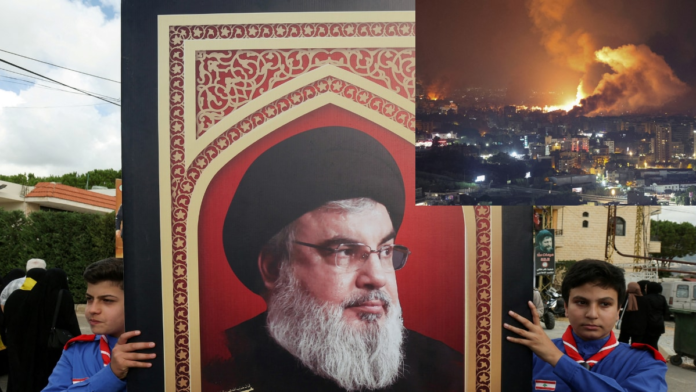Hassan Nasrallah, who has led Hezbollah for 32 years, was killed in the targeted IDF air strikes on the Iranian-backed outfit’s central headquarters in Beirut, the Israeli military confirmed on Saturday.
The strike was carried out by Israeli Air Force (IAF) fighter jets at the group’s Central Headquarters, reportedly located underground beneath a residential building in the Dahieh area. Prime Minister Benjamin Netanyahu had reportedly authorised the strike before addressing the United Nations General Assembly in New York.
‘Nasrallah was eliminated’
“The Israeli @IDF confirms that Hassan Nasrallah, the leader of the Hezbollah terrorist organization and one of its founders, was eliminated yesterday, together with Ali Karki, the Commander of Hezbollah’s Southern Front, and additional Hezbollah commanders,” the official account of the State of Israel said in a post on X.
The strike was conducted after Israel had precise intelligence indicating that senior Hezbollah commanders were present at the location, actively planning terrorist activities against Israel. “During Hassan Nastallah’s 32-year reign as the Secretary-General of Hezbollah, he was responsible for the murder of many Israeli civilians and soldiers, and the planning and execution of thousands of terrorist activities,” the IDF said in a statement.
Read More: Who is Hassan Nasrallah? The Hezbollah Leader At Target Of Israeli Strikes In Lebanon
Nasrallah’s Daughter Also Dead?
The large-scale air strikes on Friday rocked the Lebanese capital, sending thick clouds of smoke billowing over the city. This marks the heaviest assault on Beirut in nearly a year of ongoing conflict between Hezbollah and Israel, The Times Of Israel reported. Labesnes authorities said More than 700 people were killed in strikes over the past week.
Reports also emerged about the killing of Nasrallah’s daughter Zainab Nasrallah in an Israeli airstrike in southern Beirut. Israeli news channel Channel 12 reported her death, but there has been no official confirmation from Hezbollah or Lebanese authorities. If confirmed, Zainab’s death could have significant symbolic implications for Hezbollah and may influence the group’s response to the ongoing conflict with Israel.
After the Beirut strike, IDF Spokesperson R.-Adm. Daniel Hagari said that they were probing the status of Nasrallah and would update soon. “We used a highly precise strike to target Hezbollah leader Hassan Nasrallah, who was hiding in civilian buildings in the Dahiya neighbourhood of Beirut.” When asked about whether others were killed, he said, “Once we’ve finished investigating, we will update you on the details.”
Iran’s Emergency Meeting and its ‘Red lines’
Iranian Supreme Leader Ayatollah Ali Khamenei called an emergency session of the country’s Supreme National Security Council at his home Friday, The New York Times reported, citing two Iranian officials with knowledge of the meeting. President Masoud Pezeshkian also condemned the strikes as a “flagrant war crime” that “has revealed once again the nature of this regime’s state terrorism.”
Ali Larijani, adviser to Khamenei, said Israel “is crossing Tehran’s red lines, and the situation is becoming serious.” “Assassinations will not solve Israel’s problem… With the assassination of resistance leaders, others will take their place,” Larijani told Iran’s state TV, amid speculation that Nasrallah had been killed. “The resistance has strong commanders and cadres, and every commander who is martyred will have a replacement,” he said.
Hezbollah Commanders Killed
The attack on Nasrallah came as the IDF increased its strikes on Hezbollah, the Iranian proxy group that has repeatedly targeted Israel. For the past year, the IDF and Hezbollah have been involved in a limited cross-border conflict, which has been happening alongside the war in Gaza.
Read More: Israeli Military Says Several Hezbollah Commanders Killed In Targeted Lebanon Air Strikes | Video
In another update, the Israeli army said Saturday it killed the commander of Hezbollah’s missile unit in southern Lebanon in an air strike, along with his deputy and several other leaders of the group. Israeli fighter jets killed “Muhammad Ali Ismail, the commander of Hezbollah’s missile unit in southern Lebanon, and his deputy,” the military said in a statement, adding that “other Hezbollah commanders and terrorists were eliminated”.
The statement said Ismail was “responsible for many acts of terrorism…including rocket launches towards the territory of the State of Israel and the launch of a surface-to-surface missile towards the centre of the country last Wednesday”. The Israeli military said it also killed Ibrahim Muhammad Kabisi and “other senior officials in Hezbollah’s missile and rocket array”.
‘If you strike us, we will strike you’
Meanwhile, the UN has repeatedly condemned this week’s sharp escalation of violence in Lebanon. “We are witnessing the deadliest period in Lebanon in a generation, and many express their fear that this is just the beginning,” the UN humanitarian coordinator in Lebanon, Imran Riza, said. US Secretary of State Antony Blinken appealed again for a ceasefire, after a US-led bid for a truce failed earlier this week. “The path to diplomacy may seem difficult to see at this moment, but it is there, and in our judgement, it is necessary,” Blinken said.
Read More: ‘If You Strike Us, We Will Strike You’: Israel PM Netanyahu’s Big Warning For Iran At UN
The Lebanon violence has raised fears of wider turmoil in the Middle East, with Iran-backed militants across the region vowing to keep up their fight with Israel. Netanyahu took aim at Iran in his UN General Assembly address, saying: “I have a message for the tyrants of Tehran. If you strike us, we will strike you.” “There is no place in Iran that the long arm of Israel cannot reach, and that’s true of the entire Middle East,” he added.
(With agency inputs)
Read More: Israel Says It Eliminated Hezbollah Chief Hassan Nasrallah In Beirut Assault, His Daughter


